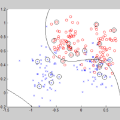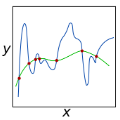Devising a fair classifier that does not discriminate against different groups is an important problem in machine learning. Although researchers have proposed various ways of defining group fairness, most of them only focused on the immediate fairness, ignoring the long-term impact of a fair classifier under the dynamic scenario where each individual can improve its feature over time. Such dynamic scenarios happen in real world, e.g., college admission and credit loaning, where each rejected sample makes effort to change its features to get accepted afterwards. In this dynamic setting, the long-term fairness should equalize the samples' feature distribution across different groups after the rejected samples make some effort to improve. In order to promote long-term fairness, we propose a new fairness notion called Equal Improvability (EI), which equalizes the potential acceptance rate of the rejected samples across different groups assuming a bounded level of effort will be spent by each rejected sample. We analyze the properties of EI and its connections with existing fairness notions. To find a classifier that satisfies the EI requirement, we propose and study three different approaches that solve EI-regularized optimization problems. Through experiments on both synthetic and real datasets, we demonstrate that the proposed EI-regularized algorithms encourage us to find a fair classifier in terms of EI. Finally, we provide experimental results on dynamic scenarios which highlight the advantages of our EI metric in achieving the long-term fairness. Codes are available in a GitHub repository, see https://github.com/guldoganozgur/ei_fairness.
翻译:在机器学习中,设计一个公平的分类器,避免对不同群体进行歧视,是一个很重要的问题。虽然研究人员已经提出了各种定义群体公平性的方法,但大多数只关注了直接的公平性,忽略了长期的影响,这在动态场景下是不适用的,因为在动态场景下,每个个体都可以随着时间改进自己的特征。现实生活中存在这样的动态场景,例如大学录取和信贷贷款,每个被拒绝的样本都会努力改变其特征以后被接受。在这样的动态设置中,长期公平性应该等同于不同群体的样本特征分布,假设每个被拒绝的样本将花费一定的努力水平。为了推动长期公平性,我们提出了一个新的公平性概念,即平等的可提升性(Equal Improvability,EI),它在被拒绝的样本经过一定努力后,等量化他们在不同群体中的潜在接受率。我们分析了EI的性质及其与现有公平性概念的联系。为了找到满足EI要求的分类器,我们提出并研究了三种不同的方法来解决EI正则化优化问题。通过在合成和实际数据集上的实验结果,我们证明了所提出的EI-正则化算法鼓励我们在EI方面找到一个公平的分类器。最后,我们提供了关于动态场景的实验结果,在这些结果中突显了我们的EI指标在实现长期公平性方面的优势。代码可在 GitHub(https://github.com/guldoganozgur/ei_fairness)上获得。



